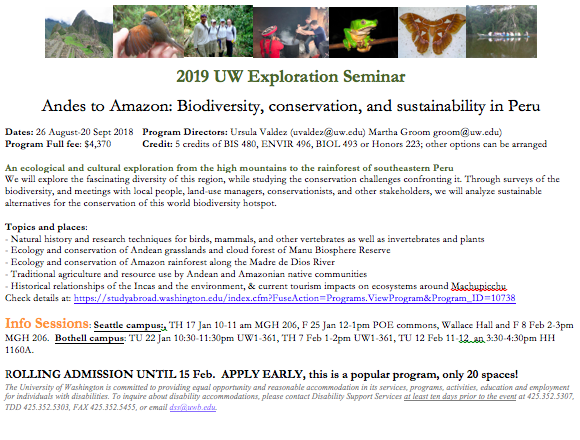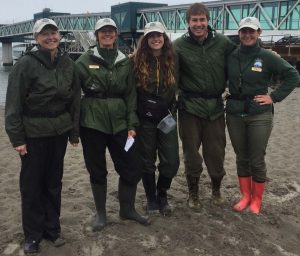 Natural Resource Specialist 1 (Marine Reserves Research Assistant)
Natural Resource Specialist 1 (Marine Reserves Research Assistant)
Salary: $3,187.00 – $4,629.00 Monthly
Location: Newport, OR
Job Type: Permanent
Department: Fish & Wildlife-Fish Division
Job Number: ODFW18-0132
Closing: 1/8/2019 11:59 PM Pacific
Make a Difference in Oregon’s Natural Resources!
ODFW Mission: To protect and enhance Oregon’s fish and wildlife and their habitats for use and enjoyment by present and future generations.
• This position is with the Marine Resources Program (MRP) of the Oregon Department of Fish and Wildlife (ODFW) located in Newport.
• This recruitment will be used to establish a list of qualified people to fill the current vacancy and may be used to fill other vacancies as they occur.
• The employee in this position will be represented by the Service Employees International Union (SEIU) and will be subject to all terms and conditions of the collective bargaining agreement. Pay and benefits on all job listings may change without notice.
• You must submit your application online. Paper applications will not be accepted.
• More information about our agency can be found on our social media accounts below and at myodfw.com and http://www.dfw.state.or.us/
Duties & Responsibilities
Unique opportunity to work at the beautiful Oregon coast and be an important contributor to a team of marine reserves science professionals!
Participate as a member of ODFW’s marine reserves program, a six person interdisciplinary team responsible for leading the management and scientific monitoring of Oregon’s five marine reserve sites. Ecological monitoring is one of the key mandates set by the State Legislature for Oregon’s marine reserves. The Governor’s Office, Oregon Legislature, and constituents have significant expectations about the successful implementation of this work. This is a complex, multidisciplinary research effort with numerous monitoring and research projects conducted simultaneously designed to meet the state’s goals, objectives, and policy mandates for marine reserves. Assist with sample design and planning, leading collection of data at-sea, data entry, data analysis, data management, oral presentations, report writing, and outreach. Major duties and responsibilities are to:
• Assist with assembling, organizing, checking, maintaining, and loading field equipment before and after at-sea fieldwork.
• Lead field technicians and/or volunteers in the field.
• Assist Research Project Leader with sampling design and planning.
• Conduct review of video footage (requires specialized knowledge of fish identification), data entry into a Microsoft Access relational database and or Excel spreadsheets, and data quality control.
• Perform data analyses including the application and analysis of statistical tests (ANOVA, regression, logistic regression, nonparametric tests, etc.).
• Produce summary tables and graphics using spreadsheet, database, GIS, and graphing software.
• Construct basic data summaries using Microsoft Excel, JMP, and Microsoft Access.
• Organize video data library, including video tape archiving onto digital media. Participate in the design and management of databases.
• Draft and provide preliminary reviews for technical and non-technical reports. Audiences may include scientists, stakeholders, general public, and decision makers. Papers for peer-reviewed publication are encouraged.
• Present ecological monitoring information to local community groups, school groups, various associations, and the general public. Present at professional meetings and conferences.
• Provide information and materials to be used in marine reserves and marine science outreach.
• Participate in logistically and operationally complex at-sea fieldwork, as part of a 3-4 person science team. Fieldwork will include conducting visual surveys (e.g., ROV, video lander and video sled surveys), extractive surveys (e.g., hook-and-line), and oceanographic surveys (e.g., CTDs). Tasks will include deploying and retrieving equipment, overseeing back-deck shipboard operations (e.g., providing direction and instructions to vessel captain and crew), and recording field data.
Working Conditions
• Requires frequent (multiple days per month) day trips to sea aboard commercial fishing, charter, and research vessels. This also includes infrequent (one to two times per year) overnight trips at sea. Work at sea will often be done during stormy weather and rough ocean conditions, and will involve working with underwater visual survey tools, oceanographic equipment, and fishing gear as well as around deck machinery such as winches.
• Requires frequent (monthly) overnight travel up and down the Oregon coast from Newport, at times during inclement weather.
• Requires considerable time spent doing survey planning, data entry, analysis, and report writing on a personal computer.
• Requires a flexible work schedule that varies in the number of hours worked on a daily basis, but not necessarily each day, or a work schedule in which the starting and stopping times vary on a daily basis, but not necessarily each day. This includes working at all hours and workdays in excess of eight hours.
NOTE: You must have a valid driver license and an acceptable driving record.
The Oregon Department of Fish and Wildlife will check driving records for in-state finalists. Out-of-state finalists will be required to present a current driving record for review.
NOTE: Within three-days of hire, applicants will be required to complete the U.S. Department Homeland Security’s I-9 form confirming authorization to work in the United States. ODFW participates in E-Verify. ODFW is not able to support VISA sponsorships.
Qualifications, Required & Requested Skills
Minimum Qualifications
• A Bachelor’s degree in Fisheries or Wildlife Science, Marine Science, Oceanography, Natural Resource Management or Policy, or a closely-related Bachelor’s degree with at least 45 quarter (30 semester) hours of biological/ecological coursework; OR
• Three years of biological experience performing studies, research, or resource management activities in a fish or wildlife program.
Note: Your application materials must clearly describe how you meet these qualifications. Answers to the supplemental questions must be supported in the “Work Experience” section of your Oregon E-Recruit application.
Note: You will be required to provide a copy of your official or unofficial transcripts (online transcripts are acceptable) if you are moved forward in the selection process that show your name, the name/address of the institution, coursework with passing grades, and degree conferred (including date), if you are using education to qualify.
Requested Skills
Preference will be given to applicants with experience in the following areas:
• Conducting marine scientific research and/or monitoring, with preference given for experience with Pacific Northwest marine species
• Conducting field work at-sea (open ocean)
• Working at-sea, aboard fishing or research vessels
• Leading field crews in at-sea field work, with preference given for experience working with volunteers in the field
• Conducting multivariate statistical
• Conducting geospatial analyses using ArcGIS
Additional Information
Your
answers to the supplemental questions must be supported by the “Work Experience” section in your Oregon E-Recruit application or you may not be considered for this position.
Resumes will not replace the completed “Work Experience” section in your online application. You may be disqualified if your work experience does not include information used to: 1) meet the minimum qualifications of the job and 2) back up your answers to the supplemental questions. Only those individuals who most closely match the requested skills will be invited to an interview.
Only complete applications will be considered. Be sure to answer all supplemental questions and attach all required documents. Late submissions will not be accepted. If you need assistance with adding attachments to your profile or to a specific job posting please go to www.oregonjobs.org and click on frequently asked questions under Resources. This quick help guide can be found under Application Process – Completing and Submitting an Application (bullet about half way down).
Note: A resume (text or attached) will not be reviewed for work experience unless stated in the job posting that it is a required attachment.
To apply, follow the “Apply” link above and complete the Oregon Employment Application online. You must click the ‘Confirm’ button at the end of the application by the posted close date to be considered for the job posting. All application materials (including transcripts) must be received by the closing date/date posted on this job posting.
YOU MUST APPLY ONLINE BY 11:59 P.M. ON TUESDAY, JANUARY 8, 2019.
Interviews: Applicants whose responses most closely match the requested skills and needs of the position will be invited to an interview. If called for an interview, applicants will be asked to sign a reference authorization and release form at the time of interview.
Reasonable accommodations for interviews will be provided upon request to individuals with disabilities.
If you are experiencing difficulty applying for this position or have questions, please contact the ODFW Human Resources office at 503-947-6051.
**IMPORTANT NOTICE – E-mail Addresses Required**
The state of Oregon requires all applications to have a valid e-mail address.
If you do not currently have an e-mail address and do not know where to go to get one please go to www.oregonjobs.org and click on frequently asked questions (FAQ’s) under Resources, then scroll down to Creating an Account for more information.
Application Reference Number: ODFW18-0132
Effective November 1, 2016, SEIU represented employees who are Public Employee Retirement System (PERS) participating members will have their base salary increased by 6.95%. Upon becoming a PERS participating member, SEIU employees pay the employee 6% contribution to PERS.
Veterans – If you are an eligible veteran and you meet the minimum qualifications, veterans’ preference points will be added to your score. To receive veterans’ preference points you MUST attach to your electronic application the following required documentation:
Veterans (Qualifying for 5 points)
A copy of the certificate of release or discharge from active duty (DD214 or 215) or a letter from the U.S. Department of Veterans Affairs indicating that you are receiving a non-service connected pension; OR
Disabled Veteran (qualifying for 10 points)
A copy of form DD214 or 215 and a copy of a letter from the U.S. Department of Veterans Affairs indicating a disability rating unless the information is included on the DD214 or 215; or a copy of a letter from the U.S. Department of Veterans Affairs indicating you are receiving service-connected compensation.
For more information on veterans’ preference points visit www.oregonjobs.org and select Veterans resources under Resources.
The Oregon Department of Fish and Wildlife is an Equal Opportunity/Affirmative Action Employer
Read the full job posting

 Save the date!
Save the date!
 Natural Resource Specialist 1 (Marine Reserves Research Assistant)
Natural Resource Specialist 1 (Marine Reserves Research Assistant)